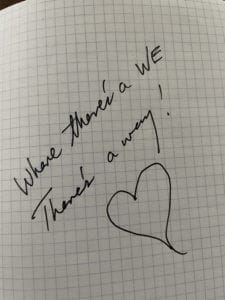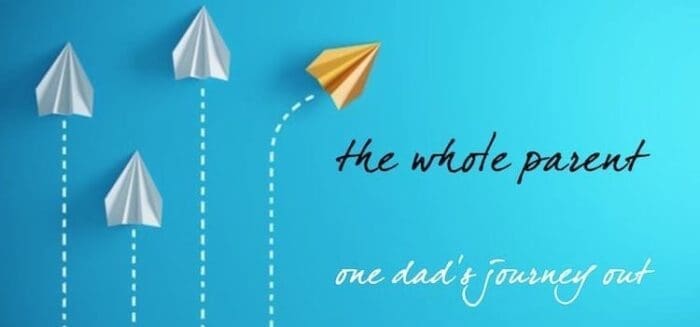Where There’s a WE There’s a Way
Let’s get a definition of something out in the open: the WE is a container that a couple begins to construct around their love and their lives. If the WE is strong the relationship will remain strong. If the WE is weak, or worse yet, nonexistent, we have a real issue to work on.
Never Been Married
Let’s say you’ve never been married. Your experience of a long-term relationship is more from your college years and less from your adult and on your own years. Perhaps there are no relationships during your adulting years. Hmmm. What does this say?
- You’ve not trudged the hard road of making it work even when it sucks
- You’re not accustomed to considering another person BEFORE making plans
- “We’re going to X, you’re welcome to come” sounds okay, but it’s a miss
- The concept of a WE produces anxiety
- You claim to want a relationship, a partnership, but you keep the relationship in a restricted mode
- There is no WE in your actions or words
Breaking the Independence Trap
It’s good when you can be self-sufficient. Independence is also a good thing. Until it’s a thing that is crushing your intimate relationship. If you’ve always done things with a “my way or the highway” approach, you’re liable to find yourself on the highway, alone. Sorry. The WE never takes the other person as an alternate, as a sub player, as a pinch hitter.
When a couple has a healthy WE container, they always check with their partner before making plans. It’s not permission, it’s participation and inclusion. If we want our parther to join us for an activity we check before scheduling to see if the time works for them as well. If we are only giving them a courtesy, “Here’s where we’re going, come along…” you’re not giving your partner the connection and consideration a truly healthy relationship requires.
Outlining the WE Container
When a partner considers the WE first it says several things:
- your participation is requested and we would alter our plans to make sure you can come
- i love and care about you and I’m going to check-in with you about next weekend before I make other plans
- my consideration of you and your schedule shows respect and care
- my boundaries are never threatened by the WE container, my boundaries and trust are strengthened by considering our partners before making other plans
- i can go do this without you, but I’d prefer it with you
- i don’t need you but I want you to come
When There Is a Power Struggle the WE Often Breaks Down
Power struggles are when one partner is manipulating the balance of power, the setting of priorities, and the spending of resources (time, money, activities). When one partner has a hard time putting themselves in the schedule as a priority, they are going to have an even harder time putting you in their schedule. As they move to take care of everyone else’s needs (kids, parents, siblings, old friends, old lovers, neighbors) there is going to be very little left over for a relationship. And even less left over for them. People who burn out by serving everyone before themselves have a very hard time hearing the word self-care. They get angry about a lack of alone time, but they don’t take any action to make it happen.
You need alone time to appreciate your together time. You need alone time to remember why you don’t want to be alone all the time. You need alone time to remember what you do for fun when NOT ONE OTHER PERSON IS DEPENDENT ON YOU.

What Do You Do To Reset?
When we are overwhelmed by “the list” we’ve got to find new ways to refocus, reset, and rebuild our own needs into the busy schedule. You can shout, “When is my alone time,” and not take any action to get alone time. That’s a poor display. If you want alone time, need alone time, aren’t getting alone time, DO SOMETHING ABOUT IT. Get alone time.
As we reconnect with our alone selves, we can recenter. We cannot center while in the maelstrom of daily life. And some people have packed their schedules and routines with so many to-do items that they never get around to their own requirements. And make no mistake, your body IS keeping score.
- You cannot outrun the fork. (eat less, eat healthily, eat organic)
- Your body is beautiful just as it is. (hating on your love handles is self-shaming)
- Your breakdowns, physically, mentally, spiritually, energetically, are telling you something: take a break
- You cannot ignore your own “entering low power mode” alert without paying the consequences
- Your body is a fully capable self-healing system, if you give it the rest, food, and quiet time it requires
- Only you know what you need
The Problem of The Problem
Let’s say one of you in the relationship doesn’t like asparagus and one of you absolutely loves it. You don’t really have a problem. But it could develop into a number of problems without some self-awareness and cooperation.
You love asparagus. You want to include it in your cooking once a week. You want your partner to try the asparagus every time you make it. You’re trying to get them on the asparagus train. It doesn’t work. You can take this development several ways.
- Be upset that you will never share the love of asparagus with your partner
- Be upset because you can’t make asparagus all the time (actually you can, so this is a lie you are telling yourself)
- Be upset because you can’t please your partner by making the perfect asparagus dish
- Be totally cool with your partner eating and liking whatever they like and eating your asparagus anyway.
Which of these approaches do you think will be most productive? Are there things in your primary relationship that are like asparagus between you? Does your partner have an air of superiority because they like asparagus and you don’t? What do you think you should do about the conflict.
You Are 100% Responsible for Your Happiness
And thus, you are also 100% responsible for your unhappiness. Your overwhelming moods. Your lack of energy. Your lack of planning. Your lack of putting your partner into your consideration-phase.
It is my belief, that if you don’t build and nurture a strong WE container with your partner, you’re going to find asparagus popping up in between you more frequently. Put the WE first in consideration and you are on your way towards building a healthier and happier partnership.
Where there’s a WE there’s a way.
Namasté,
John McElhenney – life coach austin texas
Facebook | Instagram | Pinterest | @wholeparent
Get the complete single dad story with John’s new book: Single Dad Seeks (available in all formats)
The Dating a Divorced Dad series continues:
- What the Single Dad Wants – 9 Months Later (an update)
- The Three Essential Elements of Love
- In Relationship with a Divorced Dad: Ground Rules
- A
SingleDad In Love, Again




